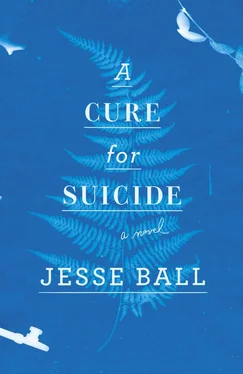— Inside! Inside, quick.
— I’m sorry, he said.
— Don’t be sorry, you fool. Close the door behind you.
She drew him up the stairs, past all the photographs and over the creaking boards.
— I LOVE YOU, he said.
— You fool, you fool, you fool, she whispered. Let us never talk of such things. If it is true that there is only for me in this horrible place one thing and that thing is you, and there is only for you in this horrible place one thing, and that thing is me, then we need not talk of love. Love is a comparison. I like him but I love another. We are at the bottom of a ditch and there is just a parcel of air to be found, a parcel and when it is done, we push at the space, and another little space of air presents itself. Who can talk of love? There is only air — or none, and if there is none then there is nothing at all.
She spoke like this, on and on, forever chiding him when he said this or that. I don’t know how long I have been in these places, really, she confided, it could have been forever. Have you known anyone else, in all this time, he asked her. I have only had the courage now, after all this time, to explain myself to someone. And why me. Because, she said, because — you were so dazed when I met you. You were still drifting inside. It was the first time I could tell for sure that someone was a living person, and not a shell like the rest of them.
— There are hundreds, maybe thousands of them, she said. Thousands of villages. There is a world beyond it, I am sure of that. But what the relationship is between the world and the villages, I can’t say. It seems that it could be that the world created the villages, that the government over all, the republic, made the Process of Villages in order to fix the people who were ill, who couldn’t bear the way the world was. It could also, however, be the case that the government merely found the villages, a separate society on its edge, and nurtured it. The distinction is that the villages might be a part of the republic, a subset of it — or they might be a separate thing, which are being used by the republic to heal itself. If the sick people are placed into the villages as part of an agreement between the villages and the republic, then they are merely servants of the republic. Then the examiners are bureaucrats of a kind, and the whole Process of Villages is a massive bureaucracy.
— But, if the Process of Villages is just a place that grew up in a sort of passive antagonism to the republic, then it could be that sick people are abandoned there by the republic, and that the examiners are just the kind people who receive them, who receive them and nurse them back to health.
— Even where that abandoning takes place — should it take place at all, is in dispute. It could be that the fogging is a thing, a kind thing done by the Process of Villages, a gentle response to the horrors of the republic. Or, it could be that the fogging is what the republic does when it washes its hands of someone, and that it is something the Process of Villages has learned to deal with — almost as though it were a peculiar malady in its own right.
— But what is fogging?
— It is an injection. I figured out how to unlock the examiner’s desk two houses ago, and I read the text they keep. The injection changes you, sends you deeper into yourself, in order that you can learn to protect yourself from life’s difficulties. It does other things, too. It ruins your memory, and you lose most things you knew. That’s why they have to teach you everything all over again.
— So, said the claimant. I was injected with something. That’s what they did. They told me I was very sick, and that…
— You were very sick, and that you almost died. That you were on the edge of death, and you were rescued, and that now you are recuperating, yes, that is what they say. It is in the book, written down for them to say it. All the questions you will ask are there, and all the answers they will give. But, what we do not know, she said, is whether the book is true. It is possible that the book is a conditional lie. It could be all the truth that enables the examiners to do their job, with all the space around filled in with lies. In fact, it is quite likely that it is that. A thinking person could conclude nothing else.
The claimant felt that he was voyaging through a place of trees. The trees were rushing by, running like dancers in a long line. They danced around him, rushing and running and leaping. Their leaves fell across his face and their limbs tore at his clothing. He felt that he was falling and that the race of the trees kept him afoot. Each time he nearly fell, he was buffeted up and all the while, a great wind swirled in the distance. He wasn’t going anywhere — he could not go anywhere — it was impossible, wherever one went, one would be rushed off one’s feet, and held afloat in a mireless confusion.
As this feeling rose in him, she noticed that his face was changing, and she slowed her speech.
— Darling, she said, darling. It is all right. It is all right. We will find some way forward. I know we will.
— But what, he said, what could such a thing be? It is all hopeless.
And as he said it, he felt that it was true.
But then Hilda took him and kissed him and held him to her, and it was the strangest thing: he was sure suddenly that it was not the bedroom of Hilda’s house that he was in, but that he was in another bedroom, in a house just like it, but one that he had never been in. And in Hilda’s place, he saw another young woman, a person he had never seen in his life, but for whom he felt great respect, in whom he had great comfort, but who could it have been, who? and he was pulling her to him, and sobbing, and he felt her body all against his. His hands were in her hair, her soft yellow hair, and he grew calm, everywhere, calm. And then he was back again, back again in the house with Hilda. She was pulling away and standing.
— COME AND SEE, Hilda was saying.
They went into the study and stood by the desk.
— The lock is just there, she said. It can be picked, and all the answers are inside. I only managed to find the book and read some of it. Then I was moved and I got a new examiner. Martin is much more watchful. He speaks like an idiot, but it is all an act. He is a monster. I am afraid of him. Not that he would hurt me, but that he knows everything that I know, and more.
— Hilda, what is your real name?
— In the last place, where I failed, it was Kat. In the town before that, it was Morna. I don’t even care about names anymore. If you could tell me my original name, it would be, it would be…
— What?
— It would be dirt, that’s all. Just dirt. Not even worth putting in one’s mouth.
IT WAS SEVERAL DAYS before he met her again. This time it was in the wood beyond the lake, just at dawn, as if they each had gone out for a walk and happened upon one another. That would be all right, they thought. Even if someone saw, such a thing would be all right.
They sat in the wood, by a stream. There was a stand of birch trees. He leaned against one and they spoke about this and that.
Suddenly, to Hilda and Martin, it felt very good to talk about nothing at all. They sat and made completely banal statements about the morning and the day and each other’s clothing (which was practically the same), and they were very happy.
This went on until Hilda began to sob uncontrollably.
Martin tried to console her. When she finally spoke, she said,
— I need for us to have a plan. Otherwise, I am afraid — I am afraid we will just go on like this, living here. I am afraid nothing will change.
Читать дальше












